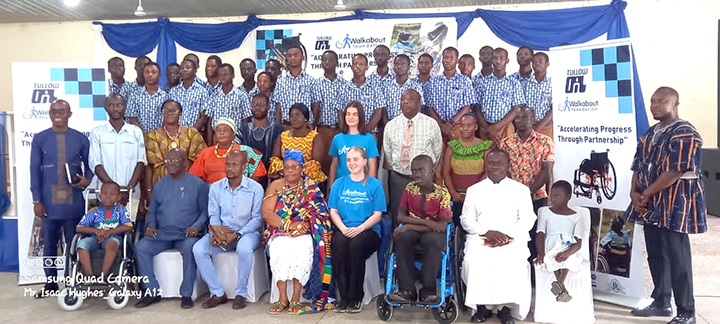Some of the beneficiaries with some members of the Foundation
About 175 persons with disabilities in the Sekondi-Takoradi Metropolis and other parts of the country have been given mobility aids to support their movements.
They received custom-fitted orthopaedic wheelchairs from Walkabout Foundation together with its local partner, Orthopaedic Training Centre which are all non-profit organisations with support from Tullow Ghana Limited.
The distribution of the wheelchairs was in line with Tullow’s philosophy and belief that the oil and gas discovery and development should drive growth in the economies where it operates.
The beneficiary physically-challenged individuals included some students.
Programmes Director of Walkabout Foundation, Ellen Gamble, noted that the move was to enable persons with disabilities mainly children to gain independent and productive lives.
She explained that the Foundation was started in 2009 by co-founders, Carolina and Luis Gonzalez-Bunster, after Luis suffered an
injury at the age of 18, which left him paralyzed from the chest down.
“Since then, the two have impacted the lives of over 60,000 PWDs and distributed over 24,000 wheelchairs in 26 countries and funding medical research to find a cure for paralysis”, she revealed.
She mentioned that the two persons also operate a Wheelchair Centre in Kenya, serving East Africa, Rehabilitation centres in Kenya and India, and a Wheelchair Distribution Centre in Haiti.
“Having also worked in 26 different countries, we have witnessed first-hand the lack of assistive technology around the world, as well as the challenges and stigma faced by people with mobility disabilities”.
For his part, Edmond Fiifi Enchill, Social Performance Manager, Tullow Ghana Limited said as a responsible oil and gas production company, Tullow believed that it operations including the production of hydrocarbons, must benefit the inhabitants of it host communities.
“We are also to promote sustainable operations and look out for the welfare of members of our host communities, particularly students,” he said.
He, therefore, advised the beneficiaries not to sell the wheelchairs but used them for their intended purposes.
From Emmanuel Opoku, Takoradi


